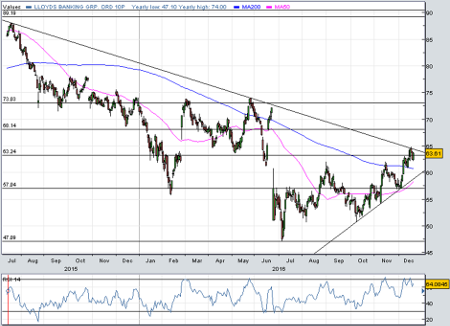Lloyds rallies after MBNA buy
20th December 2016 11:40
So, the rumours were true. is buying credit card business MBNA from for a cool £1.9 billion. It may still be feeling the pinch from the financial crisis and miss-selling scandals, but the high street lender is in a much better place now, and many banks both in America and the UK are tipped to do well in 2017. There's reassurance about the dividend, too.
For its money, Lloyds gets £7 billion of gross assets and £650 million of annual revenue, which should improve net interest margin (NIM) by about 10 basis points. In the first half of 2016, MBNA booked a net profit of £123 million after making £166 million in 2015.
A "good fit", Lloyds chief executive António Horta-Osório said of MBNA after beating off rumoured competition from private equity firm Cerberus, and . If regulators give the go-ahead, the deal should be tied up by the end of June next year and increase Lloyds' share of the credit cards market from 15% to 26%.
Investors clearly like what they see. Lloyds shares had risen as much as 2% by mid-morning to one good session off Friday's six-month high.

And there'll be savings form the MBNA deal, too. Within two years, Lloyds - still 6.9%-owned by the taxpayer - expects £100 million of annual cost savings, about 30% of MBNA's cost base.
It's also worth remembering that the purchase price includes about £800 million of acquired equity and assumes £240 million for future payment protection insurance (PPI) claims. That's the most Lloyds will have to pay, as Bank of America has clearly agreed an indemnity for future PPI-related charges, a point the seller was said to be negotiating hard on.
"The group continues to deliver strong underlying and statutory performance with strong capital generation," said Lloyds, keen to ease shareholder concerns about any possible impact on the dividend.
Low rates are good for the higher margin credit card industry, which should limit impact on dividends"As a result the group remains confident in delivering a progressive and sustainable ordinary dividend in 2016 and continues to target a payout ratio of at least 50% of sustainable earnings over the medium term."
However, whether there's surplus capital left at the end of the financial year for shareholders is unclear. The MBNA deal is expected to utilise around 80 basis points of Common Equity Tier 1 (CET1) capital - a key measure of a bank's financial strength.
At its third-quarter results late October, Lloyds reported a CET1 ratio of 14.1% before allowing for foreseeable dividends in 2016. After dividends it was a still-impressive 13.4%, and Lloyds easily passed the Bank of England's recent stress test.
So, this deal certainly looks affordable, and UK interest rates are unlikely to rise any time soon, despite a forecast uptick in inflation next year. Low rates are good for the higher margin credit card industry, which should limit any possible impact on future dividend payments at Lloyds.
"The transaction is consistent with the group's stated strategic ambitions of growing in consumer finance and will enable the group to enhance its position and offering within the UK prime credit card market," Lloyds explained Tuesday.
This article is for information and discussion purposes only and does not form a recommendation to invest or otherwise. The value of an investment may fall. The investments referred to in this article may not be suitable for all investors, and if in doubt, an investor should seek advice from a qualified investment adviser.
Editor's Picks